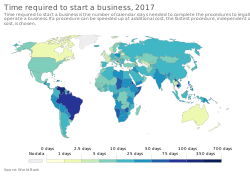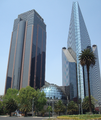Portal:Business
The Business and Economics Portal Business is the practice of making one's living or making money by producing or buying and selling products (such as goods and services). It is also "any activity or enterprise entered into for profit." A business entity is not necessarily separate from the owner and the creditors can hold the owner liable for debts the business has acquired. The taxation system for businesses is different from that of the corporates. A business structure does not allow for corporate tax rates. The proprietor is personally taxed on all income from the business. A distinction is made in law and public offices between the term business and a company such as a corporation or cooperative. Colloquially, the terms are used interchangeably. (Full article...) Economics (/ˌɛkəˈnɒmɪks, ˌiːkə-/) is a social science that studies the production, distribution, and consumption of goods and services. Economics focuses on the behaviour and interactions of economic agents and how economies work. Microeconomics analyses what is viewed as basic elements within economies, including individual agents and markets, their interactions, and the outcomes of interactions. Individual agents may include, for example, households, firms, buyers, and sellers. Macroeconomics analyses economies as systems where production, distribution, consumption, savings, and investment expenditure interact, and factors affecting it: factors of production, such as labour, capital, land, and enterprise, inflation, economic growth, and public policies that have impact on these elements. It also seeks to analyse and describe the global economy. (Full article...) Selected articleCarucage was a medieval English land tax introduced by King Richard I in 1194, based on the size—variously calculated—of the estate owned by the taxpayer. It was a replacement for the danegeld, last imposed in 1162, which had become difficult to collect because of an increasing number of exemptions. Carucage was levied just six times: by Richard in 1194 and 1198; John, his brother and successor, in 1200; and John's son, Henry III, in 1217, 1220, and 1224, after which it was replaced by taxes on income and personal property. Carucage was an attempt to secure new sources of revenue in order to supplement and increase royal income in a time when new demands were being made on royal finances. Although derived from the older danegeld, carucage was an experiment in revenue collection, but it was only levied for specific purposes, rather than as a regularly assessed tax. Also new was the fact later collections were imposed with the consent of the barons. However, the main flow of royal income was from other sources, and carucage was not collected again after 1224. Selected image
Selected economyThe economy of Iceland is small and subject to high volatility. In 2011, gross domestic product was US$12 billion, but by 2018 it had increased to a nominal GDP of US$27 billion. With a population of 387,000, this is $55,000 per capita, based on purchasing power parity (PPP) estimates. The 2008–2011 Icelandic financial crisis produced a decline in GDP and employment, which has since been reversed entirely by a recovery aided by a tourism boom starting in 2010. Tourism accounted for more than 10% of Iceland's GDP in 2017. After a period of robust growth, Iceland's economy is slowing down according to an economic outlook for the years 2018–2020 published by Arion Research in April 2018. Iceland has a mixed economy with high levels of free trade and government intervention. However, government consumption is less than other Nordic countries. Hydro-power is the primary source of home and industrial electrical supply in Iceland. (Full article...) Selected quote"In the United States, there is a union for each job function with many unions in each company. Lathe operators are allowed to operate only lathes. A drilling job must be taken to a drilling operator. And because the operators are single-skilled, a welding job required at the lathe section cannot be done there but must be taken to a welding operator. As a consequence, there are a large number of people and machines. For American industries to achieve cost reduction under such conditions, mass production is the only answer. When large quantities are produced, the labor cost per car and depreciation burden are reduced. This requires high-performance, high-speed machines that are both large and expensive. This type of production is a planned mass production system in which each process makes many parts and forwards them to the next process. This method naturally generates an abundance of waste. From the time it acquired this American system until 1973 oil crisis, Japan had the illusion that this system fit their needs."
TopicsRelated WikiProjectsDid you know (auto-generated) -
On this day in business history
General imagesThe following are images from various business-related articles on Wikipedia.
More did you know
Business news
SubcategoriesRelated portals
Things you can doUrgent and important articles are bold
WikimediaThe following Wikimedia Foundation sister projects provide more on this subject:
SourcesDiscover Wikipedia using portals |







































